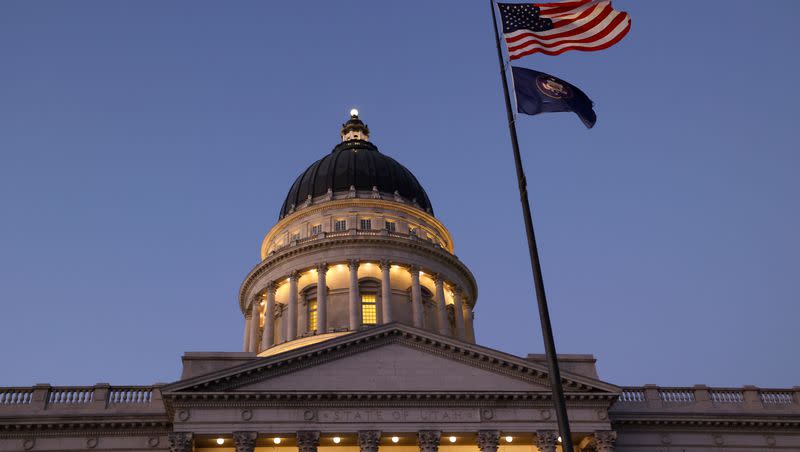Opinion: Will another tax cut help Utah compete with Silicon Valley?

If tax policies were the only factor to a vibrant economy and healthy innovation, California’s Silicon Valley would be a ghost town. The combination of high taxes, the Bay Area’s crime rate and impossible housing prices would have finished it off long ago.
But, while California may be losing people, its tech industry remains strong.
On the other end of the scale, the Tax Foundation ranks Wyoming as the state with the best tax structure in the nation, and it still has barely half a million people.
Clearly, more than one factor contributes to economic success.
However, don’t be blinded by outliers. Utah may have many attractive natural wonders and outdoor recreation areas, but taxes do matter — a lot.
The state ranks high in several surveys that measure business and economic strength. And despite politicians who sometimes seem motivated by things other than common sense, these results are not a coincidence.
After ranking the state No. 1 in its Best States ranking, U.S. News quoted professor Ilya Strebulaev of Stanford, who noted that 1 of every 61 Utah startups backed by venture capital ends up valued at more than $1 billion, a rate that is nearly 70% higher than the national average.
Related
Another income tax cut is going to cost more. So what will the Utah Legislature do?
Utah’s governor wants to talk about getting rid of the state income tax. Here’s what lawmakers say
Right now, Utah lawmakers are in the finishing stages of approving a budget that includes another income tax cut from the current 4.65% flat rate to 4.55%. They want to do this despite a revenue picture they characterize as flat, and despite it amounting to only $160 million, which would hardly be felt by the average household.
But, it would be the fourth year in a row of tax cuts in Utah, and that may just be the charm, or so researchers say.
A 2022 study on “Taxation and Innovation in the Twentieth Century,” written by Ufuk Akcigit of the University of Chicago, John Grigsby of Northwestern University, Tom Nicholas of Harvard Business School and Stefanie Stantcheva of Harvard, reads like an I-told-you-so manifesto for conservative lawmakers.
Among other conclusions, it says “Our data suggests that the largest responses to tax changes occur around three to four years after a reform.”
It did not study the cumulative effects on a state that cuts taxes four years in a row, but one may assume that little things add up over time. Or, as the study said, “Taxes can influence cumulative technological progress, which is a central feature of economic growth.”
The study was groundbreaking because it used data on taxes and corporate performance dating back to 1900. It focused on how taxes affect innovation, and it found a connection.
“Our evidence … shows that — controlling for factors such as a desire to stay in a home state — inventors were significantly less likely to locate in states with higher taxes, suggesting that taxes would have shaped long-run economic development at the state level,” it said.
The challenge is, none of this is a secret among politicians in both red and blue states. The Tax Foundation reported that 17 states saw reductions in either corporate or individual income-tax rates that took effect on Jan. 1. This has been a trend for several years.
Colorado Gov. Jared Polis, a Democrat, angered many fellow Democrats this year when he called for cuts during his state of the state address, saying “taxes are simply too high.”
Colorado’s flat rate income tax is currently 4.4%, a bit below what Utah is proposing.
Keeping up with the Joneses can be challenging in a world of tax cutters.
Right now, Utah is one of 12 states that have flat income tax rates, meaning that the same rate applies to all, rich or poor. Of those 12, Utah has the eighth highest rate, well below Idaho’s 12th-ranked 5.8%, but far from Arizona’s No. 1 rate of 2.5%.
If this year’s tax cuts are passed, Utah would rank only five hundredths of a percent behind seventh place North Carolina, unless North Carolina’s leaders decide to cut more.
And to show how competitive things have become, WalletHub recently ranked Utah 11th for innovation, just missing out on the top 10.
Some politicians, like Utah Gov. Spencer Cox, have said they would like to abolish the income tax altogether. Ohio is talking about doing this, as well.
Where does this competition end? Will states find themselves in trouble if hard times hit? Will programs for the poor and disadvantaged suffer?
Right now, Utah’s Republican lawmakers are adamant that the income tax hurts productivity, and that reducing it will keep the economic engine stoked. It might even help Utah keep pace with Silicon Valley.
For now, at least, the evidence seems to agree with them.

